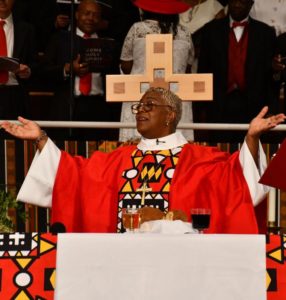June 5, 2020 in anti-racism, Bishop, Bishop messages, Communications
Church must combat racism at the grassroots

Many pastors and deacons are “on the front line” says ELCA bishop
(LWI) – The riots and protests in the United States, following the killing of a black man by a police officer, are an opportunity for people of faith to “live what we profess, to stand behind our statements and to walk according to the teachings of Jesus Christ.”
Bishop Patricia Davenport heads the Southeastern Pennsylvania Synod (SEPA), comprising Lutheran congregations in and around the city of Philadelphia. In 2018 she was elected as the first African-American woman bishop in the Evangelical Lutheran Church in America (ELCA).
As demonstrations and riots spread in protest over the killing of George Floyd in Minneapolis on 25 May, she said “there are no words to describe what I am feeling emotionally, just a numbness as I watched what was happening across the country and in my own neighborhood.” While condemning the rioting and looting, Davenport insisted: “I understand the depth of pain and the need to get out the hurt and frustration”.
Words no longer enough
 Reflecting on how to respond “to all the people I’m called to serve”, she commended the ELCA statement reaffirming its commitment to combating racism and white supremacy, but stressed that words are no longer enough. “When are we going to live our creed, to show up on the ground and work to rebuild the trust that has been broken?” she asked.
Reflecting on how to respond “to all the people I’m called to serve”, she commended the ELCA statement reaffirming its commitment to combating racism and white supremacy, but stressed that words are no longer enough. “When are we going to live our creed, to show up on the ground and work to rebuild the trust that has been broken?” she asked.
Noting that many rostered ministers, pastors and deacons were “on the front line, participating in peaceful protests or acting as a listening post to help people process”, the bishop said the church must combat racism at the grassroots. “We are offering opportunities for dialogue, for people to tell their stories and to talk about voting for local officials, because that’s where change happens on the ground,” she said.
The ELCA is a diverse community, with 65 Synods spread across the U.S. and Puerto Rico, Davenport continued. “In some places, where they don’t believe there is systemic racism, it will be harder for those communities to change,” she said. But in others, “people are gathering with public officials calling for changes in how police are trained, demanding that choke holds are made illegal and working to rebuild relationships within communities.”
Interfaith solidarity
The bishop expressed gratitude to Catholic, Muslim and Jewish members of the city’s Religious Leaders Council who are meeting together to pray for peace. “This model of solidarity is being lifted up because all communities of faith are impacted by this,” she said.
Recalling that 17 June marks the fifth anniversary of the murder of nine African American worshipers in a church in Charleston, South Carolina, Davenport said she was “grateful that Presiding Bishop Elizabeth Eaton has prepared a sermon to be shared across the ELCA, so that congregations and ministers can take this as a teaching moment. We must never forget that the young man (the shooter, Dylann Roof) was raised up in a Lutheran church, or that the list of victims’ names goes way back to all the black women and men who were lynched. We still have so much work to do.”

Asked whether the latest murders of Floyd and several other black men and women may mark “a tipping point” in the fight against racism, Davenport said: “If we believe what we have been seeing in the media of mayors and governors taking a stand, then I think we will see some change. Also, if people respond in the upcoming elections, I believe change will happen as a result of the grassroots speaking to those in power and leadership to say enough is enough.”
Originally published June 5, 2020 on the Lutheran World Federation news website.

